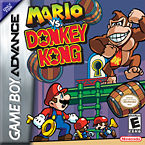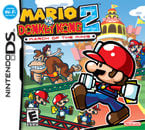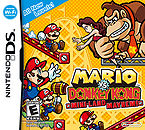Mario vs. Donkey Kong (series)
This article is under construction. Therefore, please excuse its informal appearance while it is being worked on. We hope to have it completed as soon as possible.
Template:Series-infobox Mario vs. Donkey Kong (known as Mario and Donkey Kong in Mario and Donkey Kong: Minis on the Move) is a sub-series of the Mario series and the Donkey Kong series. The first game, Mario vs. Donkey Kong, was heavily inspired by the Game Boy follow up to the original Donkey Kong game, and was initially planned as Donkey Kong Plus. This series features a comeback of Pauline and Donkey Kong's rivalry with Mario.
Games
It has been requested that this article be rewritten and expanded to include more information.
| Title, original release and system | Synopsis and Ratings |
|---|---|
| Mario vs. Donkey Kong
|
Mario vs. Donkey Kong is the first game of the series. The game was created for the Game Boy Advance, as the game brings back Mario and Donkey Kong's rivalry from the Mario series' first game, Donkey Kong. But instead of fighting over Pauline, they fight over the Mini Marios instead, at the end of the game, Mario gives Donkey Kong a Mini Mario as a gift. |
| Template:Releasedate Game Boy Advance | (Ratings unavailable) |
| Mario vs. Donkey Kong 2: March of the Minis
|
Mario vs. Donkey Kong 2: March of the Minis is a platform game and sequel to Mario vs. Donkey Kong. The game is for the Nintendo DS. It was released on September 25, 2006. Instead of the first game's plot of the player using Mario and rescuing the Minis, Mario and the Minis now fight to rescue Pauline, as the player go through stages, guiding the Minis to the end of the level. |
| Template:Releasedate Nintendo DS | (Ratings unavailable) |
| Mario vs. Donkey Kong: Minis March Again!
|
Mario vs. Donkey Kong: Minis March Again! is the third installment in the series. The game is for the Nintendo DSi's DSiWare. Similar to the second game in the series, Mario once again sends the Mini Marios to rescue Pauline from Donkey Kong. |
| Template:Releasedate Nintendo DSi | (Ratings unavailable) |
| Mario vs. Donkey Kong: Mini-Land Mayhem!
|
Mario vs. Donkey Kong: Mini-Land Mayhem! is the fourth installment in the series and the second for the Nintendo DS. As in the two previous games, Mario and the Minis set out once again to rescue Pauline from Donkey Kong. |
| Template:Releasedate Nintendo DS | (Ratings unavailable) |
| Mario and Donkey Kong: Minis on the Move
|
Mario and Donkey Kong: Minis on the Move is a Nintendo 3DS Nintendo eShop game, as part of the Mario vs. Donkey Kong series. In this game, Donkey Kong and Pauline join to run a carnival. This is also the first three-dimensional game in the series, but its gameplay is similar to the past games'. In this game, the player must place falling tiles on a field and guide Mario to the goal. Besides the main game, three extra modes and four minigames are available. |
| Template:Releasedate Nintendo 3DS | (Ratings unavailable) |
| Mario vs. Donkey Kong: Tipping Stars
File:Mario-dk-tipping-stars-boxart-eu-wii-u.jpg |
Mario vs. Donkey Kong: Tipping Stars is a Wii U and Nintendo 3DS game in the Mario vs. Donkey Kong series. It is based on the Mario vs. Donkey Kong demo shown at GDC 2014. The gameplay is the same as in Mario vs. Donkey Kong: Mini-land Mayhem. Several new features are added in the game, including Mini Luigis and the Workshop Store, where players can buy new parts for the Level Editor. Levels can be be shared online and commented on through Miiverse. |
| Template:Releasedate Nintendo 3DS/Wii U | (Ratings unavailable) |
Items and Features
Mario vs. Donkey Kong
| Item | About |
|---|---|
| Keys are found in the first half of every regular level of the game. They must be taken to locked doors in order to open the second half. | |
| Mini Marios are the objective of the second half of the normal levels, where they must be rescued from orbs. They follow Mario in Mini Mario levels. | |
| File:MvsDK 1-UP.gif1-Up Mushroom | 1-Up Mushrooms give Mario an extra life. |
| Switches are found in three versions: red, yellow and blue. As the main effect, the switch that is active makes platforms, blocks and ladders of the same color available to use. | |
| Springs help Mario to jump higher. | |
| Conveyor Belts appear in mass in some levels. They are used to transport keys and to help Mario through narrow areas. Their direction can be changed with a switch. | |
| Donut Lifts are platforms that fall down if Mario stays too long on them. | |
| Elevators are found moving on lines. Their directions can be changed with a switch. | |
| Garbage Cans can be carried and thrown by Mario. | |
| Hammers are found floating on platforms. Mario can use them to defeat enemies, such as the Oil. The can be thrown upwards and grabbed again while in the air. | |
| Presents are found in red, yellow and blue variations. They are used to a bonus game in the end of a level, as well as opening the Plus Worlds. | |
| The letters T-O-Y are found in Mini Mario levels. They must be collected by Mini Marios to open the Toy Box. | |
| Toy Boxes are the goal of the Mini Mario levels. If the letters T-O-Y are collected, it opens and allows Mario to drop off his Mini-Marios. |
Mario vs. Donkey Kong 2: March of the Minis
This article is under construction. Therefore, please excuse its informal appearance while it is being worked on. We hope to have it completed as soon as possible.
| Item | About |
|---|---|
| Coins are used to raise the score, collecting 100 gets the player a M-Token. | |
| File:Large Coin.PNG 10 Gold Coin | 10 Gold Coins are used to increase the score, but are worth 10 normal coins. |
| Cards are collectible items with a picture of Mini Mario and a letter on the back of them. There are 9 cards per world. |
Trivia
- All games in the series were initially released outside Japan, usually in North America before any other regions.
- All of the handheld games can be played on the 3DS, as the first game can be played in the Ambassodor Program, the next two are DS games, the DSi one can be system transferred and bought on the eShop, and the fifth and sixth are eShop exclusives.




